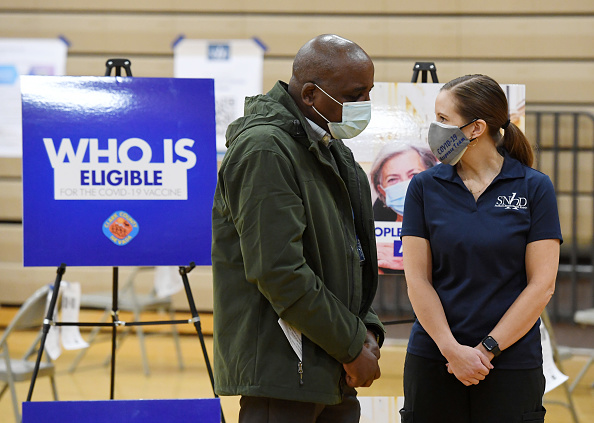Equity is the cornerstone of the US COVID-19 vaccination strategy, and federal agencies are working with health care providers, insurers, pharmacies, state and local governments and community organizations to ensure underserved people have access to vaccines, health officials told the America’s Health Insurance Plans National Policy Conference on Tuesday.
Dr. Bechara Choucair, vaccinations coordinator for the White House COVID-19 response team, said the message to the public is that all three vaccines available in the US are safe and effective, and the goal is to distribute them evenly and equitably across communities.
The government is working with the CDC, the Federal Emergency Management Agency, states, tribes and territories to create more places for people to get vaccinated as supplies increase. Retail pharmacies have been engaged in vaccine distribution, and vaccines are being supplied to 250 federally qualified health centers in areas with vulnerable populations, including people who are homeless or living in public housing, migrant workers and those with limited English proficiency.
“This is working and as of this morning we have administered, as a country, over 92 million doses of vaccine,” Choucair said.
Dr. Nancy Messonnier, director of the National Center for Immunization and Respiratory Diseases at the CDC, said more than 9,000 CDC staff members have supported the agency’s COVID-19 response, responding to nearly 1 million calls from the public and clinicians.
Vaccine success will require a “whole of society” effort involving public and private stakeholders, including businesses and nontraditional partners, Messonnier said. It will be important to circle back to people who have refused vaccination to see if they will say yes, and the CDC is providing tools to help address vaccine hesitancy.
More than 31 million Americans are fully vaccinated, Choucair said, and 60% of those over age 65 have had at least one vaccine dose. He called it good progress but added “we still have a long way to go.”
Dr. William Shrank, Humana’s chief medical and corporate affairs officer, said health insurers are taking an intentional approach to reducing vaccine distribution disparities with the Vaccine Community Connectors pilot program, run by AHIP in partnership with the Blue Cross Blue Shield Association, which has a goal of vaccinating 2 million Americans ages 65 and older in underserved communities. They are working to leverage data and build relationships to identify vulnerable sectors of society and provide outreach to address distribution barriers.
Insurers are working to provide accurate vaccine-related information to their members and health care providers. Shrank said Humana has a call line to answer questions people have and help them schedule a vaccination appointment, adding that there is a lot of confusion among the public.
Humana has worked also with pharmacies to get blocks of appointment times so it can identify at-risk members, make appointments for them and then help with issues such as transportation.
Beyond distribution is the need to monitor people who have been vaccinated for adverse events. The CDC launched the V-safe After Vaccination Health Checker, a smartphone tool that lets people send a text after they have been vaccinated to tell the CDC if they experienced any side effects.
Dr. Robert Gluckman, chief medical officer at Providence Health Plan, said Providence is linking vaccination registration with the V-safe campaign and encouraging people to participate.
Choucair said the Biden administration has adopted a “whole of government” strategy to fight the pandemic, adding the country “deserves a response driven by science, data and public health.”
____________________________________
Ellen Beck is a staff writer and editor who specializes in health care and wellness. She has been a journalist for more than 30 years for print, wire service and online publications, and in radio news.
Sign up for AHIP Solutions SmartBrief for more health care policy and insurance news, research and commentary. And for more health care content delivered straight to your inbox, check out all of SmartBrief’s health care newsletters, covering health IT, news for insurers, news for health care providers and more.
